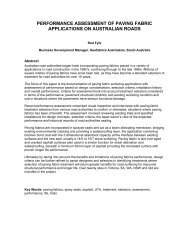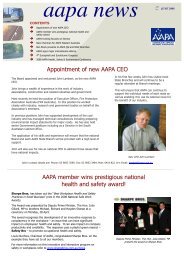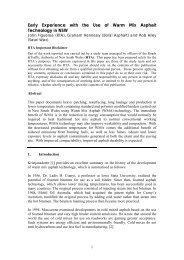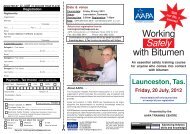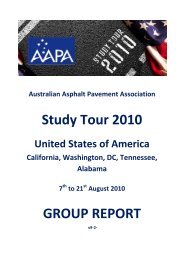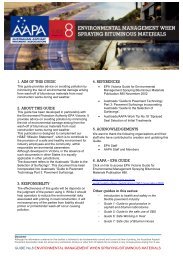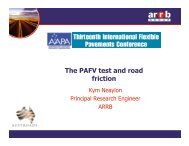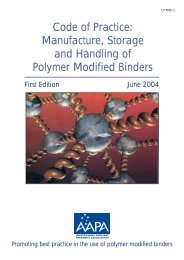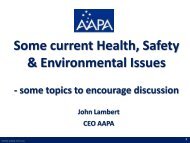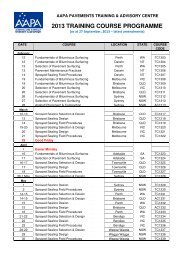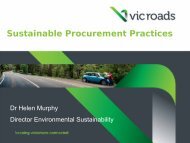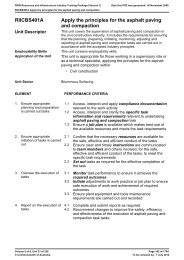April 2010 - Australian Asphalt Pavement Association
April 2010 - Australian Asphalt Pavement Association
April 2010 - Australian Asphalt Pavement Association
Create successful ePaper yourself
Turn your PDF publications into a flip-book with our unique Google optimized e-Paper software.
National Greenhouse & Energy Reporting (NGERS)Under the National Greenhouse and Energy Reporting (NGER) Act, 2007every corporation should have reported its energy consumption by end ofOct 09, if, in the 2008-9 financial year:- It or a member of its corporate group had operational control of afacility that emitted 25kT or more of greenhouse gases (CO2-e),or produced or consumed 100TJ or more of energy; or The corporate group emitted 125kT or more of greenhouse gases(CO2-e), or produced or consumed 500TJ or more of energy.Although bitumen has been defined as a reportableenergy source, it is not actually consumed and assuch emits no greenhouse emissions. It is also100% recyclable. AAPA has therefore recommendedthat bitumen be removed from the list of reportablematerials. However, until it is removed, anycorporation using bitumen is likely to be required toreport.For the 2009-10 financial year it must report if it meets the above facilitythreshold, or as a corporate group if it emits 87.5kT CO2-e of emissionsor has produced or consumed more than 350TJ of energy.Under the Act, bitumen is defined as a reportable energy source whichmust be reported even though it is not “burnt”. As a guide,approximately 2315 tonnes of bitumen used is equal to around 100TJ ofenergy consumed. If a facility (asphalt plant or spray seal operation)uses more than this amount of bitumen in a year, reporting is required.AAPA has negotiated with the Department of Climate Change andreached agreement in principle that the point of consumption of bitumenfor the purposes of the Act is when it is first converted into anotherproduct, for example, when it is converted into asphalt or PMB or issprayed as a seal. This means that bitumen use is only reported once.If you require any further information contact theDepartment of Climate Change. Also in <strong>April</strong> theDepartment is holding a series of training workshopsto provide interactive instruction on how to use theOnline System for Comprehensive Activity Reporting(OSCAR).The free, half-day training will also comprise a briefoverview of National Greenhouse and EnergyReporting issues. To attend emailreporting@climatechange.gov.au, writing “OSCARworkshop: (designated city)” in the email title.For more information refer to Department of Climate Change’s website http://www.climatechange.gov.au/government/initiatives/nationalgreenhouse-energy-reporting.aspxor call the Department on 1800 018 831Global <strong>Asphalt</strong> <strong>Pavement</strong> Alliance supports Warm MixThe Global <strong>Asphalt</strong> <strong>Pavement</strong> Alliance (GAPA) met in January andagreed to issue a statement supporting warm mix asphalt (WMA).GAPA represents the European, US, South Africa and <strong>Australian</strong><strong>Asphalt</strong> <strong>Pavement</strong> <strong>Association</strong>s as well as the Japan Road Construction<strong>Association</strong>.In its press statement GAPA notes that the effectiveness of this greentechnology “.... has been proven through ongoing implementation inEurope and the United States.” GAPA also believes that warm mix willinevitably become “... the standard practice for asphalt mixtureproduction.”In making these comments GAPA encourages those in our industry,including government agencies to become informed about warm mixasphalt technology and move towards its implementation.We know that asphalt is a clean and green material.It is 100% recyclable and produces very littlegreenhouse gas in the production of bitumen andasphalt.But with warm mix we can even further reduceemissions as well as increase safety for workers.AAPA supports the call by GAPA to use WMA subjectto it being validated as equivalent or better than hotmix asphalt.Global <strong>Asphalt</strong><strong>Pavement</strong> AllianceTHE WORLD RIDES ON USA copy of the position statement may be downloaded from the AAPA website www.aapa.asn.au.Warm Mix Validation Project UnderwayWarm Mix <strong>Asphalt</strong> (WMA) is of great interest in Australia as well asoverseas. It presents an important opportunity for fuel savings at theasphalt production plant, reduced greenhouse emissions, lower roadclosure times and a range of other benefits. The inclusion of increasedamounts of recycled asphalt (RAP) makes it even more appealing.AAPA therefore initiated a project with Austroads to validate theperformance of WMA in Australia. As a first step the Austroads <strong>Asphalt</strong>Research Reference Group (ARRG) – made up of AAPA industry andRoad Authority members – developed a WMA Trial Protocol.The ARRG Protocol provides an agreed set of tests and conditions for anational validation project. It includes monitoring of cracking, rutting,texture and surface condition over at least a two summer period. This isexpected to validate that WMA will meet the same requirements as HMA.<strong>Asphalt</strong>Following the development of the protocol AAPA andAustroads have now initiated a validation project tobe conducted on a roadway provided by VicRoads.Industry will lay a range of WMA and HMA surfacesincluding surfaces having different proportion ofrecycled asphalt. Testing will then be overseen byARRB. State Road Authorities from across Australiaare also participating.The trial will commence this month with a view toguiding changes to State and Municipalspecifications to allow projects Managers topurchase WMA as a material of choice.For further information contact Cassandra Simpson on 03 9853 3595, 0422 397 939 or Cassandra.simpson@aapa.asn.au



